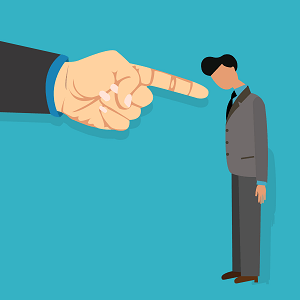From The Guardian, Mark Rice-Oxley, author of the new memoir, “A Memoir of Depression and Recovery,” says that while antidepressants have saved many lives, they’re not a cure-all. Here, he gives a short list of some ideas of what might really help. Read his article.
Drugs Alone Won’t Cure the Epidemic of Depression. We Need a Strategy.
How People With Depression Interact With the World Differently
Depressed people just don’t walk through the world the same way as non-depressed people. It may or may not be self-evident, but Lindsey Holmes writes specifically about how they behave differently. Read her blog here.
Am I Depressed Because I’m a Lawyer?
Patrick Krill, a lawyer turned mental health counselor and consultant to law firms about lawyer mental health issues tries to answer the question: “A predicate to all of this, however, is the need to determine if you are actually depressed. Maybe you just hate your job, end of story. Moving on to a different practice or firm could be the change you need. Or, maybe you have an underlying medical condition that is masquerading as or causing a depressed feeling.” Read the rest of his blog here.
The Creativity Cure for Depression: An Interview with Dr. Carrie Barron
Podcast: Play in new window | Download
Today’s guest is Dr. Carrie Barron, a board-certified psychiatrist/psychoanalyst on the clinical faculty of the Columbia College of Physicians and Surgeons who also has a private practice in New York City. She has published in peer-reviewed journals, won several academic awards, and presented original works related to creativity and self-expression at national meetings of the American Psychoanalytic Association. Along with her husband, Alton Barron, M.D., a hand and shoulder surgeon, she co-authored the book, The Creativity Cure: How to Build Happiness with Your Own Two Hands.
Dan:
Why is depression such a problem in our culture?
Carrie:
I think the level of stress has gone up enormously because we have so much to do and we’re on twenty-four hours a day. So I think because of technology, which offers us so many great things, but gives us much to do. I think that’s part of it. I also think, especially for children, we’re in a striving, ambitious, be productive all the time mentality – for children and adults. We need to play, we need to hangout, we need to have spontaneous time. I think spontaneous thought does a lot for alleviating depression and anxiety.
Big Law Tackles Mental Health Crisis Issues With On-Site Programs; Is Its Business Model at Fault?
The ABA Journal report that Big firms have long been reticent to openly address addiction and other mental-health problems, despite research showing lawyers face higher rates of substance abuse, depression, and suicide than the wider population,” the article says. “Law firm leaders say the need to keep up appearances in a competitive industry has contributed to the resistance. That attitude, however, is slowly changing. Read the article.
Inside the Los Angeles Clinic That Uses Ketamine to Treat Depression
From LA Magazine. Advocates are hailing ketamine therapy and its attendant hallucinations as the ultimate brain hack. Prominent doctors and even the stodgy National Institute of Mental Health have championed the treatment as a powerful weapon in the battle against depression, one that could potentially prevent people from taking their own lives. Read the article.
The Strategies That Science Actually Shows are Effective for Depression
From Forbes magazine. As most people who have dealt with depression know, good treatments are hard to come by—but they do exist. Part of the issue is that a given treatment may work for one person and not the other, and it may take several tries before the right therapy, or a combination of therapies, is arrived upon. Here are some of the methods that have been shown to work, and are worth considering. As always, finding a therapist you trust and connect with is often the first step to figuring out which route to take. Read the article here.
A Stroll Through The Park on a Sunny Day
During my depression, my world narrowed. I just didn’t want to go anywhere. My life was lived inside coffee shops, on the couch watching television, sitting in my office with the door closed. There was something deadening about this. In hindsight, I guess I felt that doing something else wouldn’t make a difference anyway.
I have learned over the years that nature is a powerful antidote to depression. Being in nature does make a difference. Maybe it’s because there is such power in nature. It’s always in motion, isn’t it? There isn’t any clinical depression in nature. Humans evolved from the natural world, not from concrete and office towers. One study found that a walk in a park or countryside reduced depression whereas walking in a shopping center or urban setting increased depression. This summer, I am going to reconnect with nature by taking my daughter on nature walks. During these times, I just want to let my incessant conversation with my depression go and let nature speak to me.
Depression Undercover: A Trial Lawyer’s Secret
Once upon a time, I was a trial attorney at a personal injury defense firm. I was good at it. I always pushed hard; always did the best job possible. I won a good share of cases, and, of course, lost a few as well. I was valued highly enough to be made a partner shortly after joining the firm.
But I had a dirty little secret. I had bipolar disorder, which was well-controlled through a close partnership with a good psychiatrist. Still, in my mind, if word ever got out, my employers would see me as weak, a liability. To a degree, I understood. If the insurance companies that paid the bills learned that one of the firm’s trial attorneys had such a condition, their mandate would be clear: if you want our business, get rid of him. That is what I assumed.
Throughout my career, colleagues would make offhanded remarks about someone “not taking his medication.” I would grit my teeth and ignore it.
Instead, I was able to construct an alter-ego, the “happy warrior.” I had a smile on my face and a sardonic remark ready on cue. But I went about my daily business feeling like a secret agent in a Cold War spy movie. If my cover was ever blown, I was certain that my career would be at an end.
Over time, maintaining this secret identity while dealing with the usual strains of trial practice gave rise to a growing depression. Yet I still performed at a high level and still got results.
Although I had a close friend at the firm, another partner, he would deflect when I tried to talk to him about my depression, so I stopped. I began to worry that others at the firm might know about me.
Fear and the sense of isolation only fed upon themselves in a continuous cycle. I finally experienced a severe episode of depression that led to a period of disability. When I told my boss what was going on, he expressed genuine surprise that I was suffering from depression at all.
When I returned to work, I felt better, but I remained wary. Instead of engaging in a conversation about what had happened, we all acted as though nothing had occurred. The computer was rebooted, and business continued on as usual. I went back undercover, and no one seemed to mind.
Simply due to scheduling conflicts and adjournments, it was some time before I tried another case. I admit that I was a little nervous, but I was having no trouble handling my case load. I was puzzled when my boss came into my office one afternoon as I was preparing for the trial. He asked me if I felt good to go. He had never done that before. I said, “yes,” because I felt perfectly up to the task. I never asked myself, “If he is worried about my performance, why is he even letting me try the case?”
At trial, the insurance company sent an adjuster to audit the proceedings, a routine procedure. I knew him well, and he had an excellent grasp of the case, even though he had not been involved before trial. We had constant discussions about what was going on, and we seemed to be in sync. Suddenly, the insurance company pulled my old friend off the case and replaced him with a mid-level manager who consistently praised my performance.
The case went to verdict, and the jury awarded somewhat less than what the insurance company had offered settle for. To preclude the possibility of an appeal, the insurance company threw in a few more dollars. Case closed, on to the next one. To me, that was a pretty good result.
Was I in for a big surprise.
Shortly after the trial, year-end reviews were scheduled. I was getting ready for another trial, and I was very excited about it, so I wasn’t really paying attention to what was going on in the office. Other attorneys were getting their reviews – important because raises would be discussed – but I was never called in.
Ultimately, my case settled after much hard work on all sides, and the usual time for reviews was long past. I did start to worry then. I even made a remark to my secretary about it.
The call finally came. When I stepped into the conference room and saw every equity partner in the firm waiting for me, I knew. The spy had been caught, but what would happen?
My boss said that they waited to speak with me because they did not want to put pressure on me while I was preparing for another trial. He asked me if I felt capable of trying cases. I paused and then broke under the years of strain. I wept, and answered, “No.” Whether that “No” was true then or true now or was ever true, it was the most humiliating moment of a 20-year career.
My boss started to dissect my prior trial, telling me that the insurance company’s representative was reporting that I was doing a bad job. He even told me that the supervisor at the insurance company knew that I had depression. After the expected awkward silence, another partner suggested that “we find a creative solution” to keep me at the firm. I made some suggestions over the next few months. No replies were forthcoming. I was quietly being swept out the door. It wasn’t hard to get the message. I found another job and moved on.
The whole experience seemed to confirm everything I feared about being a lawyer with depression. Currently, I am not practicing, and am seeking other opportunities.
But if the story ends there, what is the point? Can I offer my account as a teaching opportunity? At the very heart of the tale lies the sad truth that we, as lawyers, trained to be superlative communicators, can utterly fail to make each other understood when it comes to depression. Should I have been more candid about my condition? My employers never told me what concerns they had or what they knew. Could all of us have been proactive for our mutual benefit, especially after I returned to work? I believe that there had been an opportunity to open a constructive dialogue, but my fear told me to keep my mouth shut. I cannot speak for my former employers, although I highly doubt that they held any malice. I doubt that they thought much about it at all until some critical pressure was brought to bear, whether from within or outside of the firm. Unfortunately, by the time everyone was talking, my job at a firm I loved was gone.
I miss working there. I still have close friends there. I see them when I can, which is not often enough. Just recently, I ran into my secretary, and we briefly chatted about my plans for the future. And then she said something that cut me to the quick: “You were a good lawyer.”
— Anonymous guest blog
My Family, My Depression
“If you look deeply into the palm of your hand, you will see your parents and all generations of your ancestors. All of them are alive in the moment. Each is present in your body. You are the continuation of each of these people” – Thich Nhat Hanh
Like all parents, my Mom and Dad were flawed people – as I am. Yet, they were something more than that.
I’ve struggled to understand them much of my adult life; maybe more so now that they’re both gone. Here’s a picture of them from 1946 cleaning up the reception hall after a two-day celebration.
The nineteenth-century German philosopher Arthur Schopenhauer once wrote:
Built by Staple Creative














